9 Creative Ways To Use Google's Keyword Planner Tool - Search Engine Journal
One thing that attracts many entrepreneurial-minded spirits to the SEO industry is its dynamic design.
Strategies are changing continuously based on each client's focus and industry, preventing proverbial cookie-cutter practices.
This is especially true when approaching keyword research.
There are many keyword research tools available, and each requires a unique creative focus to produce the best search opportunities.
For this article, I'll home in on one tool from the internet Mothership that sometimes gets sidelined for SEO due to its ad-based focus: Google Keyword Planner.
Here, you'll find nine Keyword Planner research tips that can help you target more profitable terms in organic and paid campaigns.
1. Choose Low Volume, High-Reward Keywords
First and foremost, you want to know which products, services, and keywords deliver the most profit.
With this information, you can create a list of seed keywords to launch your first plan of attack.
Generally, I focus on quality over quantity, which typically equates to low volume over high volume.
For example, one of our clients is an environmental consulting company, so getting someone to convert an organic piece of content for an "SWPPP Plan" could yield that company thousands of dollars in one sale.
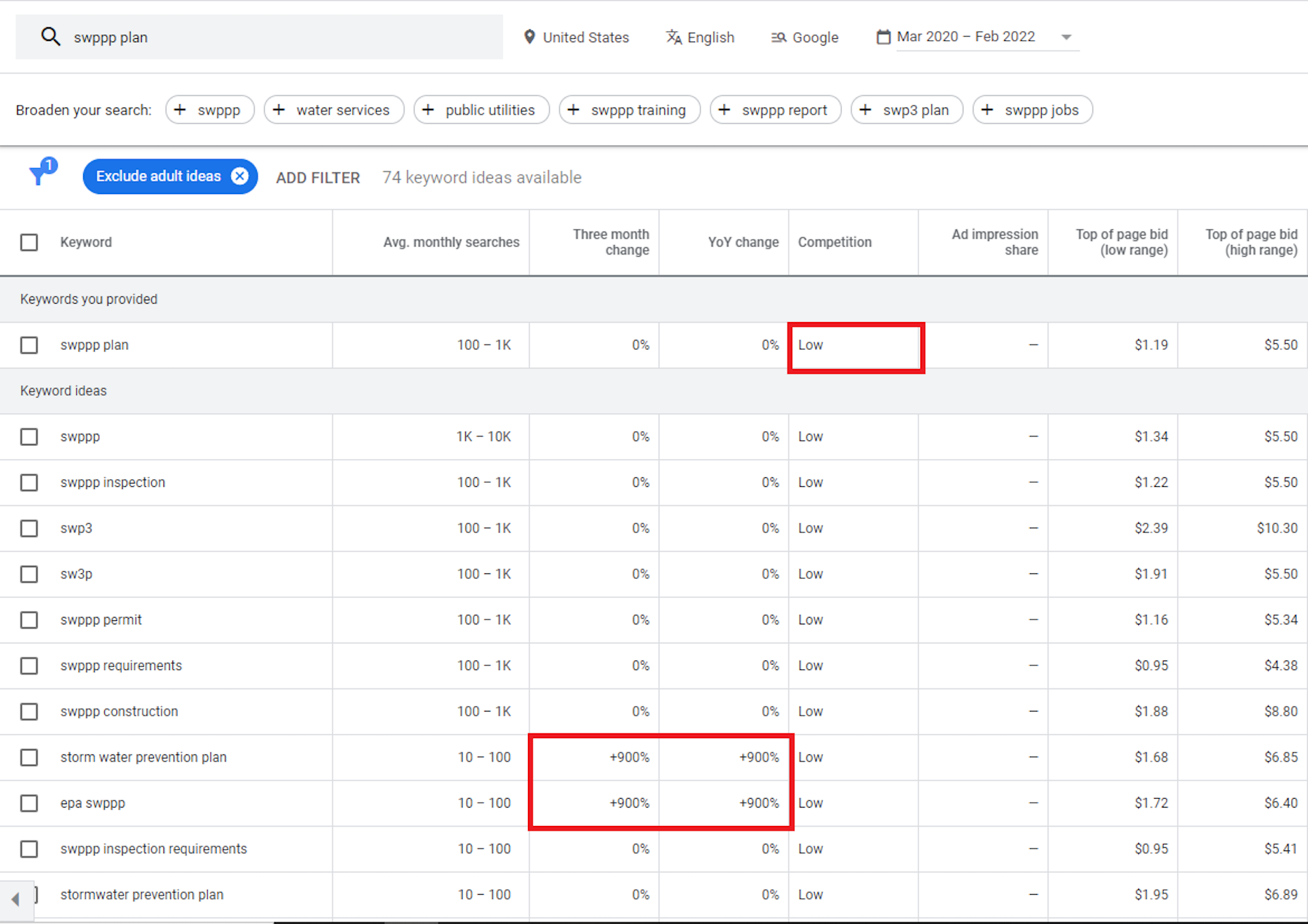 Image from Google Keyword Planner, April 2022
Image from Google Keyword Planner, April 2022As you can see, search competition for many of these keywords is low, and volumes are rising for many relevant keywords in that space.
Due to increasing environmental concerns, keywords like these will continue to grow and make money for whoever captures their organic share.
Bonus Tip: If you're looking for more accurate keyword volumes, use another keyword planner like Semrush or create a high bid using the max CPC on a keyword to better understand its total volume and monthly impressions.
2. Sort Keywords By Intent
Next, compile a list of keywords for each campaign and sort by intent.
Unfortunately, Google's Keyword Planner doesn't provide any filters for intent, such as commercial, informative, or navigational intent.
However, we can glean commercial intent from other keyword phrases by filtering keywords by Top of Page Bid in ascending or descending order.
For example, pages with higher Top of Page Bids typically have highly competitive commercial intent and imply relatively good conversion rates if advertisers are willing to bid so highly on these terms.
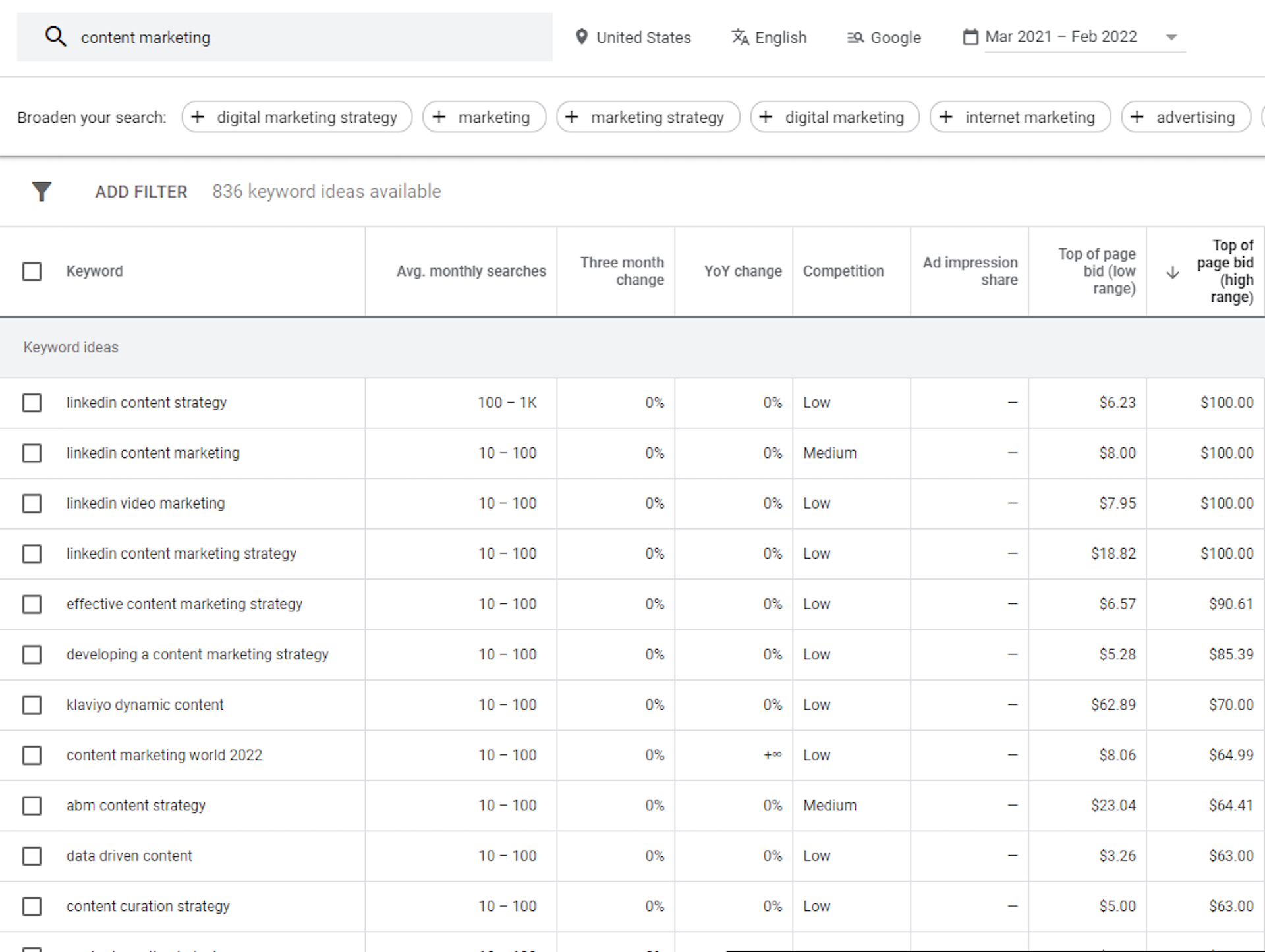 Image from Google Keyword Planner, April 2022
Image from Google Keyword Planner, April 2022LinkedIn content marketing is a highly sought-after term with lots of competition based on this research.
However, you can flip this list in ascending order to discover keyword terms with greater informational intent.
Using our previous example of "SWPPP Plans," we find informational keywords with low bids in ascending order.
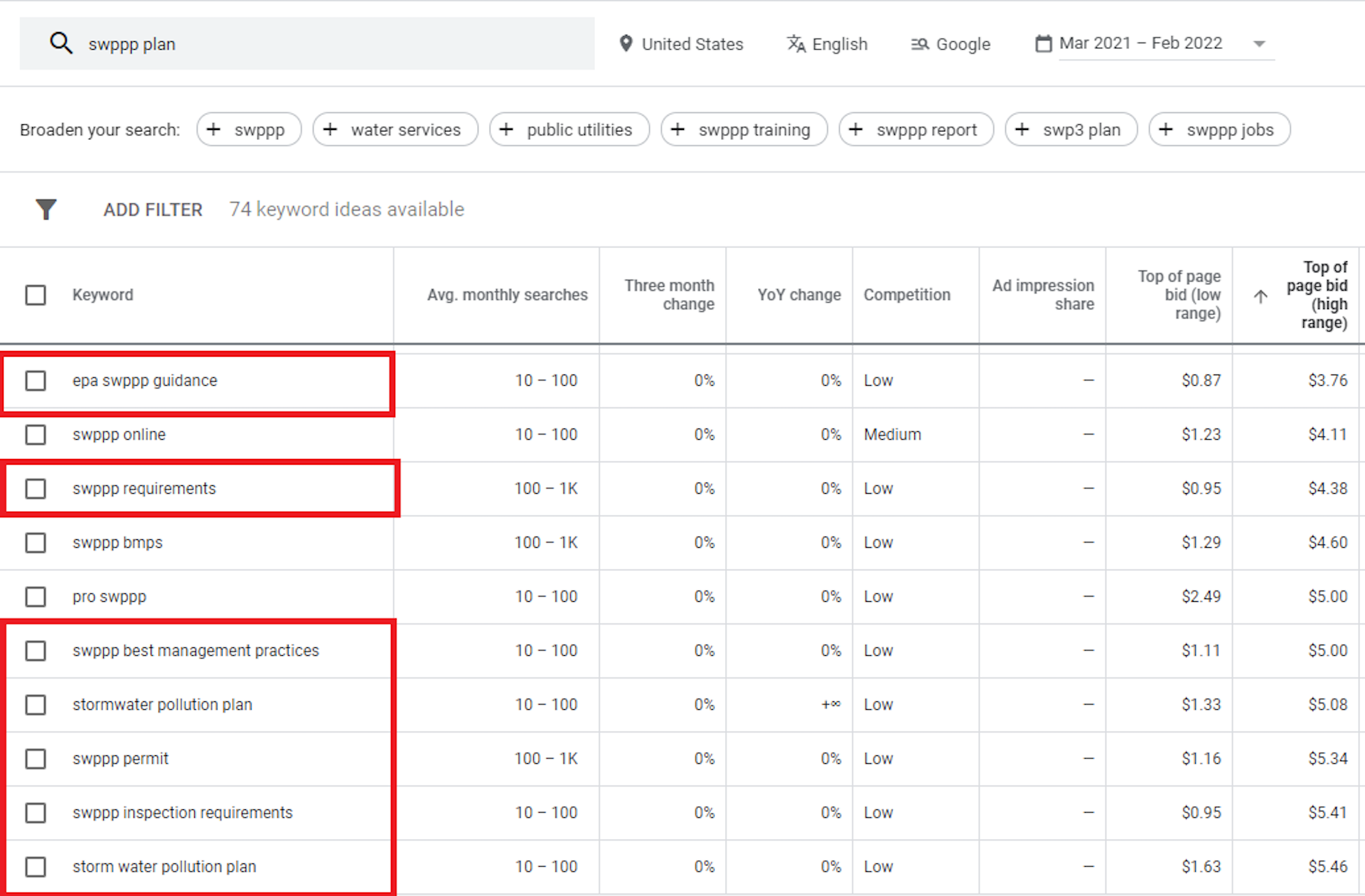 Image from Google Keyword Planner, April 2022
Image from Google Keyword Planner, April 2022Bonus Tip: Using phrases like "buy," "coupon," "sale," etc., will help you separate keywords by commercial intent.
On the other hand, terms like "best practices," "top," and question phrases will signify informational intent.
3. Take Keyword Ideas From Competitors
While several competitive research tools are available, including Ahrefs, Semrush, Majestic, etc., you can conduct competitive keyword research right in Google's Keyword Planner.
In fact, right when you log onto Keyword Planner, they offer options to search for keywords using a seed keyword or a competitor website.
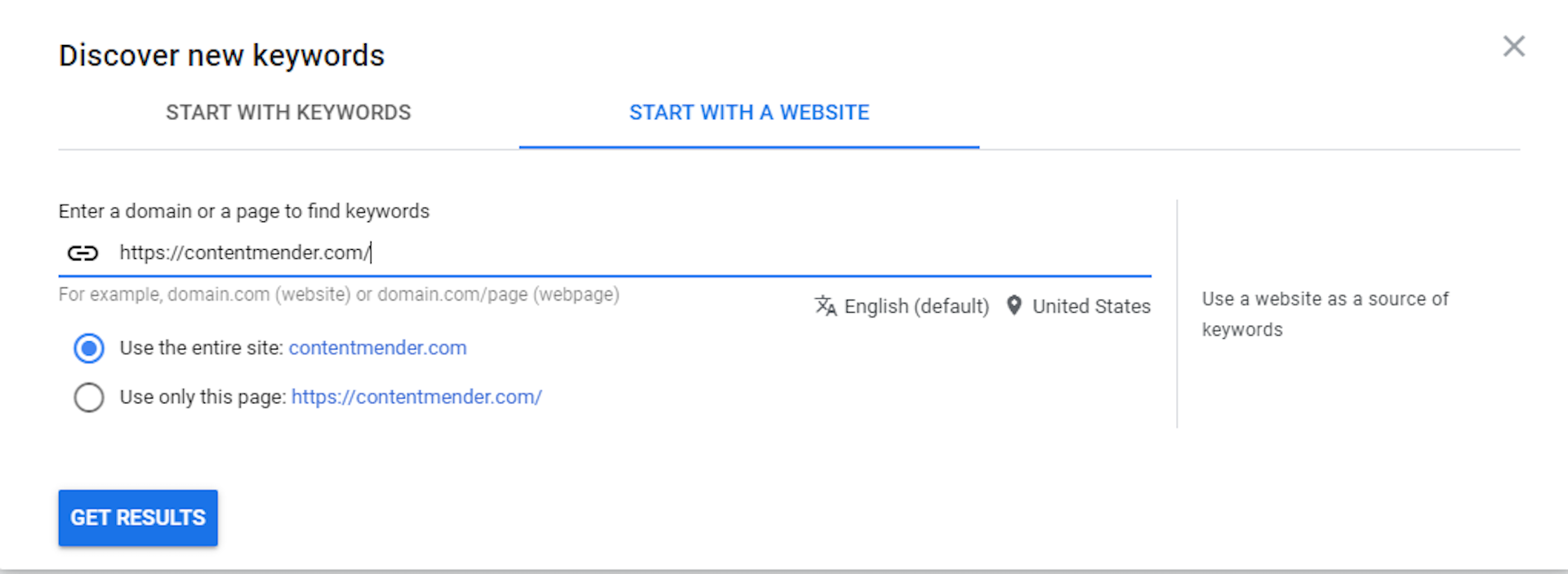 Image from Google Keyword Planner, April 2022
Image from Google Keyword Planner, April 2022Google will provide a list of all keywords this website ranks for, and you can filter out keywords by brand name to get a good list of keywords a website is ranking for.
Bonus Tip: Click Organic Average Position in Custom Columns to see where this website ranks for specific keywords to generate ideas for success.
4. Skyscraper Content Using Page-Specific Keywords
You may notice that Google Keywords Planner provides a keyword overview of your competitor's website and page-specific content in the image above.
If you were searching for topics and keywords for top or mid-funnel content that drives traffic to your website, you could use any of your favorite competitor research tools to see which pages are driving traffic to a website.
Of course, you could also manually input any webpage that your competitor outranks you for and discover other keyword ideas and variations.
For example, using Semrush, I found that this article on alternative search engines pulls in the highest annual traffic for Search Engine Journal.
I can see the most relevant keywords driving traffic to that web page by copying and pasting the link in Keyword Planner.
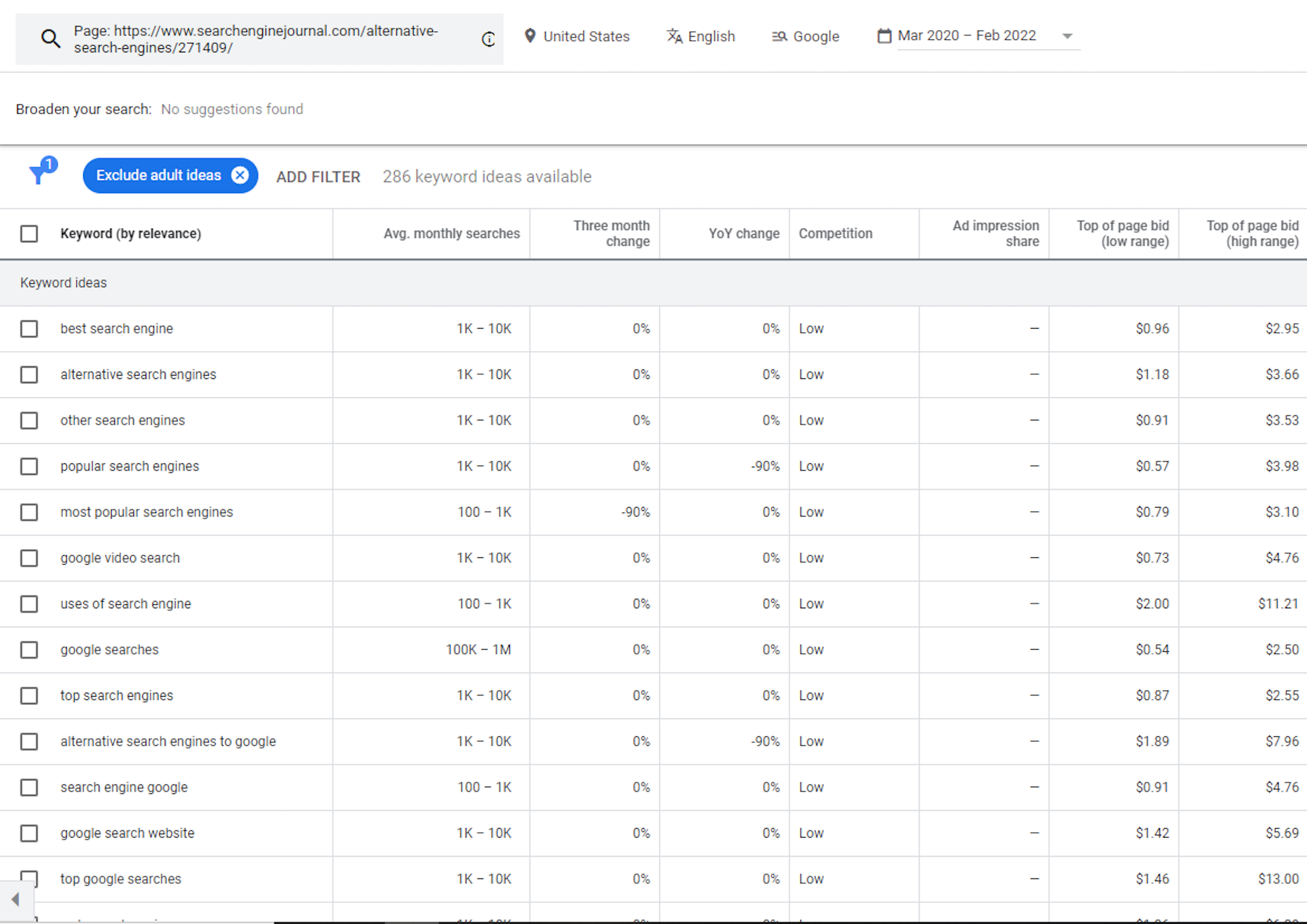 Image from Google Keyword Planner, April 2022
Image from Google Keyword Planner, April 2022You could even bid on these keywords if you're so inclined, whether you're marketing an alternative search engine or an awesome piece of content.
Bonus Tip: Conducting page-by-page keyword research, you can discover other keyword variations Google ranks that page for that you otherwise would not have inputted in your content.
5. Satisfy Intent With Keyword Questions
Informative content answers as many user questions as possible.
This provides several advantages for your SEO and content strategy, including:
- Ranking for rich snippet and answer box searches.
- Satisfying user intent.
- Outranking the competition by holding user attention for longer and garnering more clicks.
- Ranking for even more keywords than a broad seed term.
Fortunately, Google's Keyword Planner provides easy filters to input question phrases, such as "what," "when," "where," "why," and "how" to help create stellar content that satisfies user intent and educates users.
Bonus Tip: AnswerthePublic is a free tool that provides common user questions in an easily visualized format to help you answer as many questions as possible.
In addition, Google's answer box and commonly searched results at the bottom provide good indicators of what questions users are researching.
6. Filter By Location
Another great feature of Google's Keyword Planner is the ability to filter ads and impression shares to specific locations.
Google even lets you filter keyword search volumes down to the city level.
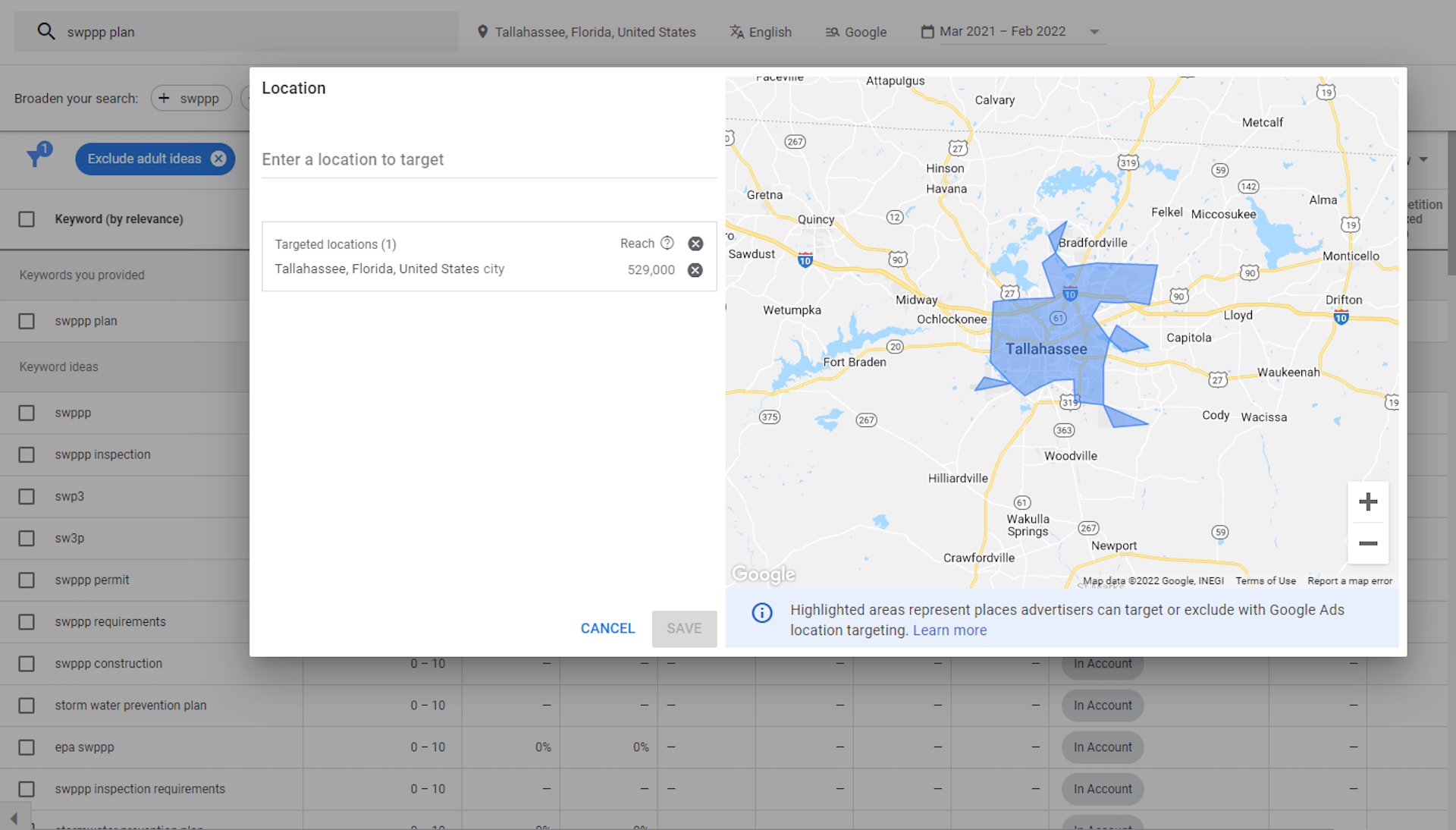 Image from Google Keyword Planner, April 2022
Image from Google Keyword Planner, April 2022In addition, you can access search volume data by state or region to find out where most of your traffic and customers originate in Google's Forecast tab.
For example, below, I looked up the search volume for "SWPPP plans."
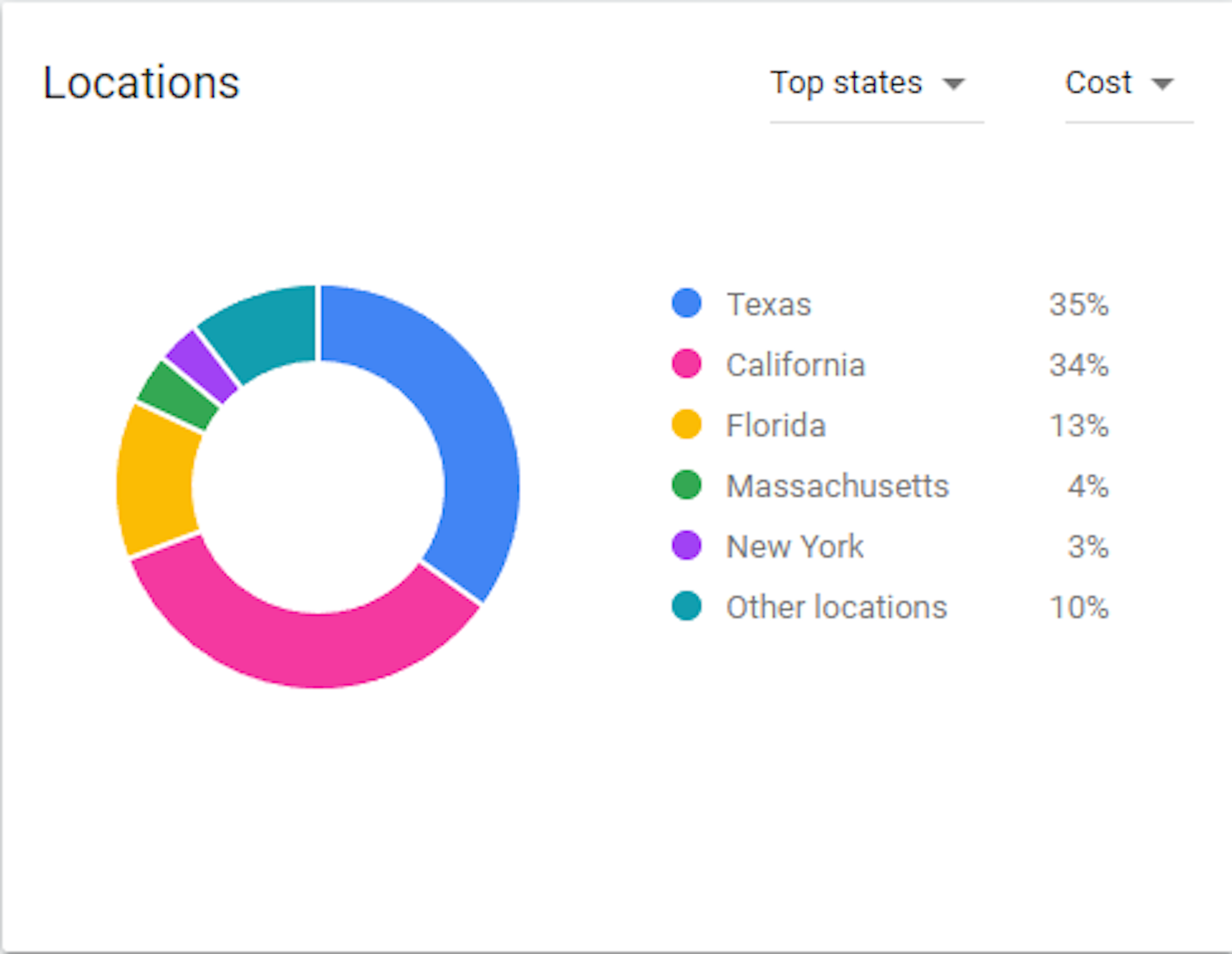 Image from Google Keyword Planner, April 2022
Image from Google Keyword Planner, April 2022Using this data, you could create location-specific landing pages for SWPPP plans for California, Texas, Florida, etc.
Bonus Tip: Filtering searches by location also provides a good baseline for the amount of reach local ads on Facebook and other networks will garner.
For example, if most searches are regionally specific, this could help you avoid wasteful spending across all ad platforms.
7. Optimize Keywords By Device
In addition to location and intent, optimizing web pages for different devices is also critical.
I created an ad campaign targeting "roof repair" in the Dallas metro area in the example below.
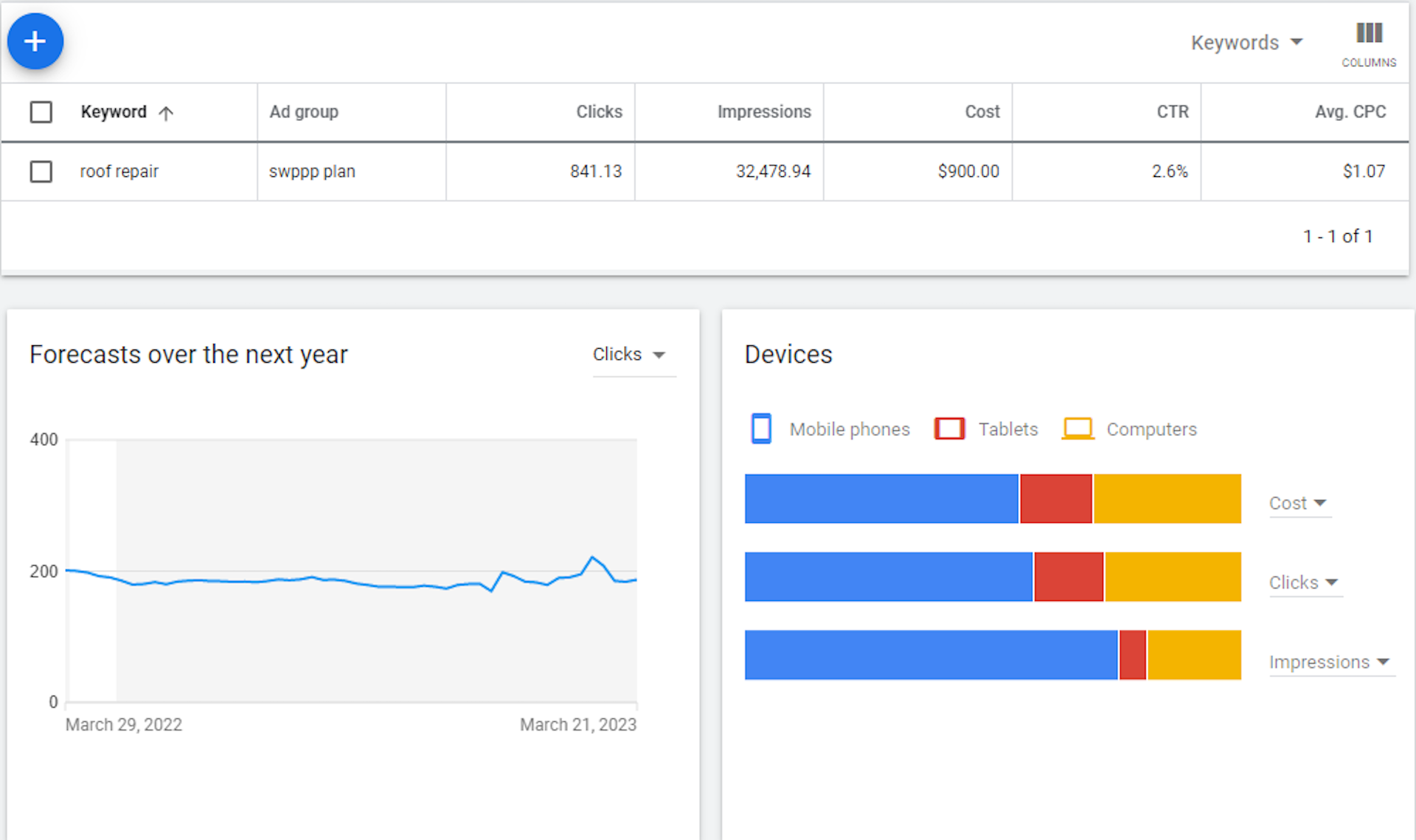 Image from Google Keyword Planner, April 2022
Image from Google Keyword Planner, April 2022Not so surprisingly, most of these searches occur on mobile devices and are most likely done as "near me" searches.
Based on this evidence, optimizing landing pages for mobile devices, inserting a click-to-call CTA, curating a strong brand presence on local directories, and optimizing the Google Business Profile (previously Google My Business) with clear contact information will net the most conversions for most ad campaigns.
Bonus Tip: Understanding which device users search for products allows you to target users on those devices with retargeting ad-based campaigns across social media and other websites.
8. Search For Keywords By Groups
Advertisers mostly use this strategy, but it provides a rich information resource for SEOs and content marketers.
By searching for keywords in Grouped View, instead of Keyword View, Google organizes keywords directly for you by category.
For example, by using the seed phrase "homemade kombucha" and "best kombucha," you can see the number of keywords and topic ideas generated with two simple keywords.
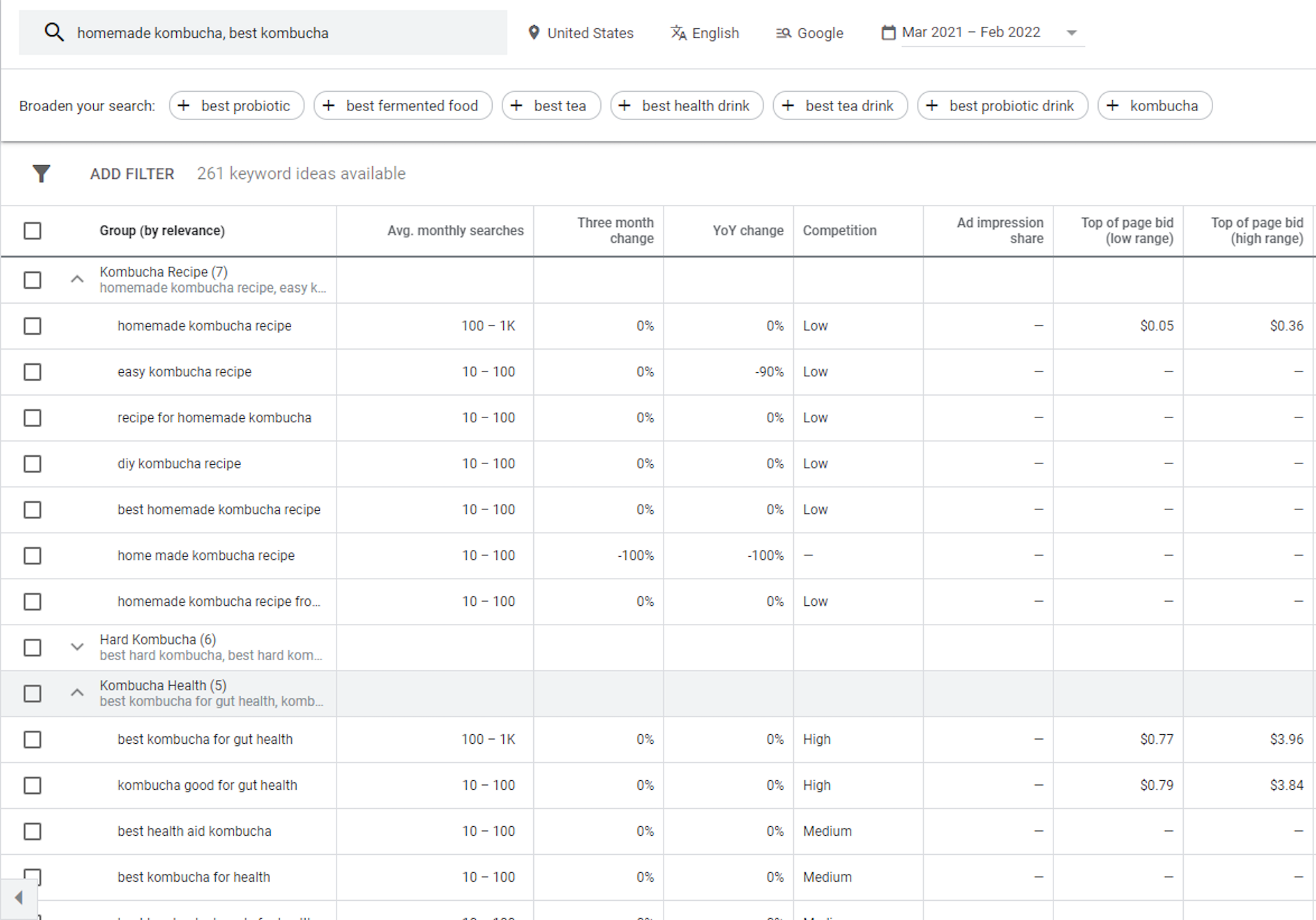 Image from Google Keyword Planner, April 2022
Image from Google Keyword Planner, April 2022By grouping these keywords by category, you could create page-specific content for each group, utilizing each keyword in the group to help optimize your content.
Bonus Tip: If you notice up top, Google provides relevant keyword and topic ideas to expand your marketing efforts further.
9. For the Ads – Remember To Bid On Branded Keywords
Finally, one converting strategy for advertisers is if you've run out of keyword ideas, consider bidding on the branded keywords and redirecting user searches to your website.
You can use this strategy genuinely if you sell brand-name products on your website, such as Nike shoes, if you sell apparel, or if you want to gain more clicks for your own branded keywords.
There are several advantages to bidding on branded keywords, including:
- Taking up more SERP real estate.
- Lower costs (for the actual business brand).
- Higher CTRs (especially if it's your brand).
- Gain greater data about user intent and on-page metrics.
- Build exposure for your brand.
Bonus Tip: You could also bid on competitors' keywords to be competitive. While this strategy is not foolproof, sometimes it's a good way to steal away traffic and clicks from competitors.
However, this plan could always backfire, and your competitor could do the same to you.
Google's Keyword Planner is free to use with a Google Ads account and provides users with most of the tools needed to start keyword research and begin a multi-faceted digital campaign.
Furthermore, what Keyword Planner lacks in functionality can be made up for in third-party tools and a bit of creativity.
More resources:
Featured Image: Nikolay Klimenko/Shutterstock
Comments
Post a Comment